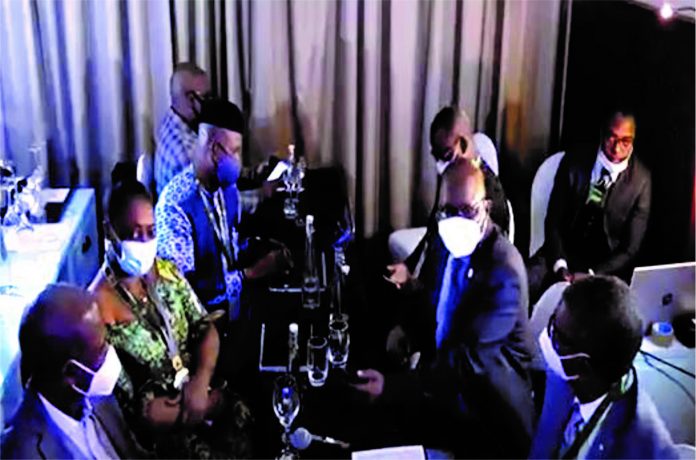
The president of the Federation of African Engineering Organisation (FAEO), Ing. (Mrs.) Carlien Bou-Chedid – who is the first female Ghanaian Engineer to head the federation, has led a team of African Engineers to sign a historic Africa, Asia, Pacific (AAP) Accord during a virtual ceremony. The African team was in Zambia for the Engineering Institution of Zambia’s (EIZ) Annual Symposium.
The AAP Accord is intended to create a framework for an International Standard of Engineering Education, and covers the education of Engineers, Technologists and Technicians. The Accord will, among other things, facilitate the mobility of those graduates holding suitable qualifications under the Accord.
The president of FAEO and president of the Federation of Engineering Institutions of Asia and the Pacific (FEIAP), Prof. Dr. Huang Wei, signed the AAP Accord. The ceremony was witnessed by the president of the World Federation of Engineering Organisation (WFEO), Prof. Dr. Gong Ke; WFEO Executive Vice President, Engr. Mustafa B. Shehu; and several other dignitaries from UNESCO and the African Union, and members of Engineering Institutions from Africa and Asia.
Speaking at the ceremony, the president of FAEO, Ing. Mrs. Carlien Bou-Chedid, explained the Accord’s significance, saying: “The AAP Accord means engineering courses under its mandate will be accredited to uniform standards within each category”.
She observed that with signing the AAP Accord, FAEO has come a step closer to realising the vision of harmonising engineering standards in Africa; and showed appreciation to her predecessor, Eng. Martin Manuhwa, for initiating such an important Accord.
“Educational institutions in Africa can have quite different standards even within the same country, and the opportunity this Accord gives for international benchmarking is welcome,” she added.
She mentioned that the African Continental Free Trade Agreement (AfCTA) defines the direction for free movement of goods and services in Africa; and this Accord addresses the details by facilitating the mobility of engineering practitioners within the continent. She explained that FAEO is leading the push for regulation of engineering practice in Africa, and expressed delight that the accord will not only help in the assessment of qualifications from other countries, but will also help to deepen the understanding of each other’s cultures.
On his part, the FEIAP president, Prof. Huang Wei said he considers signing the Accord a great milestone in the history of FAEO and FEIAP as well for Engineers around the world: in that Africa is joining hands with other member-countries to promote quality engineering education and practice, which will create a larger market for their services.
The president of the World Federation of Engineering Organisations (WFEO), Prof. Dr. Gong Ke, expressed delight that he was witnessing the signing of the AAP Accord. He emphasised that the AAP Accord will harmonise engineering education and practice, and provide global benchmarks and standards for engineering education and practice in the world.
Other top officials who witnessed the signing ceremony and gave solidarity messages included: Prof. Dr. Shahbaz Khan – Director of UNESCO in Beijing and Representative to China, DPRK, Japan, Mongolia and Republic of Korea; Dr. Eng. Ahmed Hamdy – Executive Director of African Union-STRC & AU-ASRIC, represented by Dr. Mohammed Kyan; Dr. Peggy Oti-Boateng – Director, Division of Science Policy ad Capacity-Building (SC/PCB) – UNESCO; and Dr. Thulstrup Hans – Officer in charge, UNESCO Cluster office in Asia and the Pacific.









